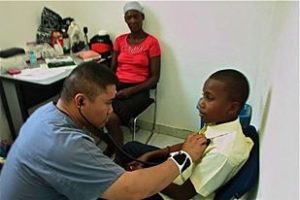A review of the literature on best practices for medical volunteer projects
October 17, 2016 |
“To date, no publication has identified individuals or organizations who should lead the movement to build consensus around global standards for STMM work.”
Roche et al adds an important systematic review of best practice recommendations for short term medical service trips (MSTs, also known as medical missions or global health experiences). It includes 92 descriptive and theoretical papers since 2010, and categorizes their recommendations under the six building blocks of the WHO Health Systems Framework: leadership, financing, healthcare workforce, healthcare products and technology, information and research, service delivery.
Here’s my (rarely referenced) summary of the common recommendations from the Roche review, which I’ve recategorized under the framework that we’ve been using at Medical Service Trip (Maki et al). Almost all suggestions mirrored the ones proposed by Lasker (Hoping to Help), Seager (When Healthcare Hurts), and Maki et al, which suggests substantial emerging consensus about the ways that MSTs can ensure high standards.

Preparedness
1. Credentialing/screening of volunteers.
This includes legal authorization and registering with the Ministry of Health in the host country.
2. Practice guidelines/cultural orientation.
“Establishing a process to determine a minimum standard of care for STMMs would help combat the notion that any care is better than no care, and assist volunteer medical teams with difficult treatment decisions.”
MSTs should explore the feasibility of using international guidelines. Predeparture training should prioritize skills for low resource settings, recommendations on what to bring, vaccines, personal safety, travel advice for in country travel, etc.
3. Diagnostic/treatment resources
MSTs should consider the shelf life, storage, distribution, disposal, and local availability of medical products, treatment, and diagnostic technology, and follow the WHO Guidelines on Medicine Donations.
Education
1. Capacity building.
MSTs should include a bidirectional teaching component, in which both local and visiting professionals share their expertise.
Cost
1. Cost for patients.
There is controversy on what constitutes a fair cost to patients, with three papers suggesting care should be free and one that points out that MSTs “should not provide free care if that decreases revenue for local providers”. Patek suggests that MSTs should have a self sustained revenue source.
2. Cost effectiveness.
The economic investments made by volunteers, host communities, and the Ministry of Health should all be transparent.
Impact and safety
1. Quality of interventions.
There is controversy on whether minimum standards for care should be identical to those in North America, or tailored to the resource-limited context.
2. Medical record keeping is frequently inadequate (Chary, 2015).
MSTs should have a standard template and protocol for communication of medical information.
3. Morbidity and mortality review:
MSTs should ensure accountability with ethical reviews, adverse event reporting, and quality assessment/improvement programs
4. Evaluation of outcomes is essential.
Sustainability
1. Continuity of care is essential.
2. Local leadership of operations,
in order to to minimize impact on regular healthcare delivery, and avoid disenfranchising local healthcare workers. There should be collaborative agreements with host communities, and MSTs should make use of local healthcare providers wherever possible.
3. Collaboration:
MSTs should integrate with, and refer to local health care services, as well as collaborate with other local volunteer groups.
Efficiency
1. Triage and patient census:
MSTs should limit the number of patients seen and clinician hours worked.
Register
Sign up for free to flag trips of interest and email organizations directly through our directory.
Comments
0 comments